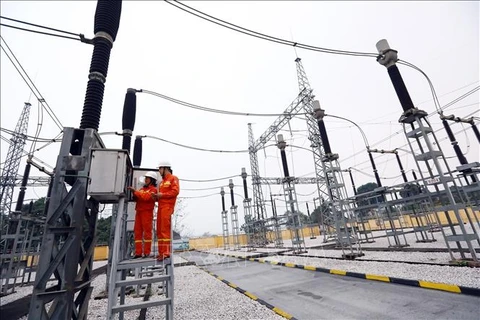Hanoi (VNS/VNA) - Electricity prices must be market-based to encourage power savings and new investments in the energy sector, experts have said.
The Government’s subsidy for electricity is no longer appropriate given that the country is anticipated to continue facing a power shortage for socio-economic development.
According to economist Tran Dinh Thien, electricity prices in Vietnam are subsidised by the Government to maintain a low level with the aim of supporting the disadvantaged in society, despite rising input costs. The subsidised electricity prices have caused a market imbalance, where power producers such as Vietnam Electricity suffer heavy losses and the market experiences a supply shortage.
"High electricity prices are not as big a problem as power cuts," Thien added, emphasising that market-based pricing should become dominant and lead the development of the electricity industry.
Thien further noted that electricity prices should be sufficient to cover product costs, while the Government’s subsidy must be separated from the pricing. “Electricity prices must ensure a balance between generation and consumption.”
Nguyen Tien Thoa, former Director of the Department of Price Management under the Ministry of Finance, said that electricity prices were reviewed for adjustments every six months under the Prime Minister’s Decision 24/2017/QĐ-TTg, in effect from August 15, 2017, on the mechanism for adjusting the average electricity retail price.
Over the past six years, electricity prices had been adjusted only three times, which did not accurately reflect market fluctuations, he stated.
Last year, input costs increased by 9.27%, but electricity prices were raised by only 3%.
"While low electricity prices are believed to be beneficial for production and daily life, they pose a significant problem for electricity producers as they might struggle to secure capital for reinvestment. This also creates difficulties in attracting new capital for electricity generation, transmission, and distribution, which could lead to severe power shortages," Thoa explained.
“It’s time to apply a market-based principle to electricity pricing,” Thoa asserted.
Ha Dang Son, an energy expert, mentioned that if electricity prices remained low, it would be challenging to encourage power saving and promote a green transition.
Low electricity prices created unfairness between enterprises striving to switch to green energy and those using energy-consuming technologies, Son pointed out.
According to Thoa, major sources of electricity supply include hydroelectricity, thermoelectricity, and gas-fired power, with hydroelectricity accounting for around 28 % of output and having the lowest product cost.
He noted that the product cost for oil-fired electricity was 5,000 VND per kWh, and 2,500-2,800 VND for coal-fired.
The current average electricity retail price is 1,920.3732 VND per kWh, following an increase of 3% on May 4./.
The Government’s subsidy for electricity is no longer appropriate given that the country is anticipated to continue facing a power shortage for socio-economic development.
According to economist Tran Dinh Thien, electricity prices in Vietnam are subsidised by the Government to maintain a low level with the aim of supporting the disadvantaged in society, despite rising input costs. The subsidised electricity prices have caused a market imbalance, where power producers such as Vietnam Electricity suffer heavy losses and the market experiences a supply shortage.
"High electricity prices are not as big a problem as power cuts," Thien added, emphasising that market-based pricing should become dominant and lead the development of the electricity industry.
Thien further noted that electricity prices should be sufficient to cover product costs, while the Government’s subsidy must be separated from the pricing. “Electricity prices must ensure a balance between generation and consumption.”
Nguyen Tien Thoa, former Director of the Department of Price Management under the Ministry of Finance, said that electricity prices were reviewed for adjustments every six months under the Prime Minister’s Decision 24/2017/QĐ-TTg, in effect from August 15, 2017, on the mechanism for adjusting the average electricity retail price.
Over the past six years, electricity prices had been adjusted only three times, which did not accurately reflect market fluctuations, he stated.
Last year, input costs increased by 9.27%, but electricity prices were raised by only 3%.
"While low electricity prices are believed to be beneficial for production and daily life, they pose a significant problem for electricity producers as they might struggle to secure capital for reinvestment. This also creates difficulties in attracting new capital for electricity generation, transmission, and distribution, which could lead to severe power shortages," Thoa explained.
“It’s time to apply a market-based principle to electricity pricing,” Thoa asserted.
Ha Dang Son, an energy expert, mentioned that if electricity prices remained low, it would be challenging to encourage power saving and promote a green transition.
Low electricity prices created unfairness between enterprises striving to switch to green energy and those using energy-consuming technologies, Son pointed out.
According to Thoa, major sources of electricity supply include hydroelectricity, thermoelectricity, and gas-fired power, with hydroelectricity accounting for around 28 % of output and having the lowest product cost.
He noted that the product cost for oil-fired electricity was 5,000 VND per kWh, and 2,500-2,800 VND for coal-fired.
The current average electricity retail price is 1,920.3732 VND per kWh, following an increase of 3% on May 4./.
VNA

























